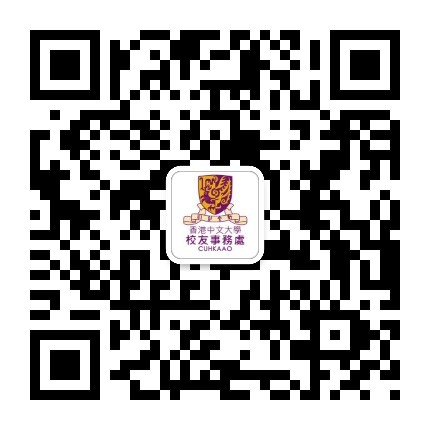Philip Chiu Takes on Deanship of CUHK Faculty of Medicine
Dedication to Nurturing 21st Century Medical Professionals
CUHK Alumnus Philip Chiu Wai Yan (94/CC/MBChB; 09/GS/Doctor of Medicine) has been appointed as the new Dean of CUHK Faculty of Medicine with effect from 1 Feb 2024. With determination to practise medicine since he was a child, Philip has always felt that helping people is a beautiful thing. Coupled with his love of science and science fiction (sci-fi) movies, he is dedicated to applying scientific research on medical practice, such as inaugurating the Multi-Scale Medical Robotics Center (MRC) in 2020. Taking the position as the new Dean, Philip expresses that while technology can certainly assist doctors in making diagnoses, it still lacks the warmth of the human touch. Therefore, the Faculty of Medicine will nurture a new generation of future-ready medical leaders with communication skills and resilience, helping them to stay true to their human-centric aspiration to learn about medicine.
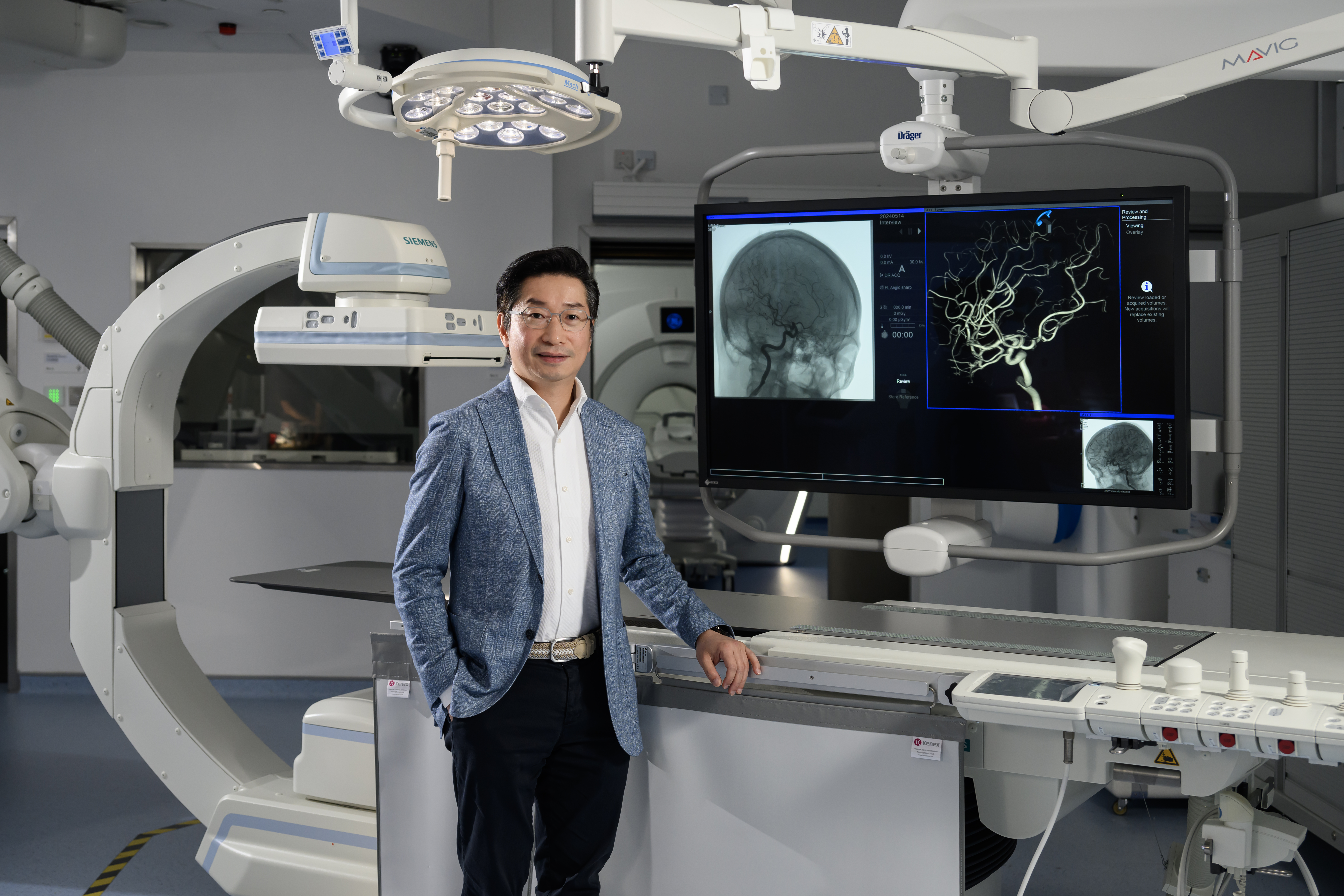
Being interviewed at the MRC, Alumnus Philip Chiu openly discusses the Faculty of Medicine's future development plans.
Q: As a master of Chinese painting, what inspirations have it brought to your life and work?
A: I learned the Lingnan School of Painting from Professor Chao Shao-an when I was 14 years old. This decision stemmed from my mother, as she had been fascinated by Professor Chao's exhibition and became indulged in painting. Later on, when I developed an interest in Chinese painting, she referred Professor Chao to me too – and we became fellow apprentices! Although I was probably the youngest student, I came to realise that my master taught me more than painting techniques – there were plenty of lessons in life. Chinese painting and culture are closely related, especially for the Lingnan School's motto "to synthesize the East and the West, and to harmonize the past and the present", which seamlessly coincides with CUHK's development. My master also mentioned that the paintings from predecessors should only serve as references. If one were to simply copy, their individuality would be buried. This has inspired me to strive for breakthroughs in my work in innovation and technology. I have gained invaluable lessons from painting.
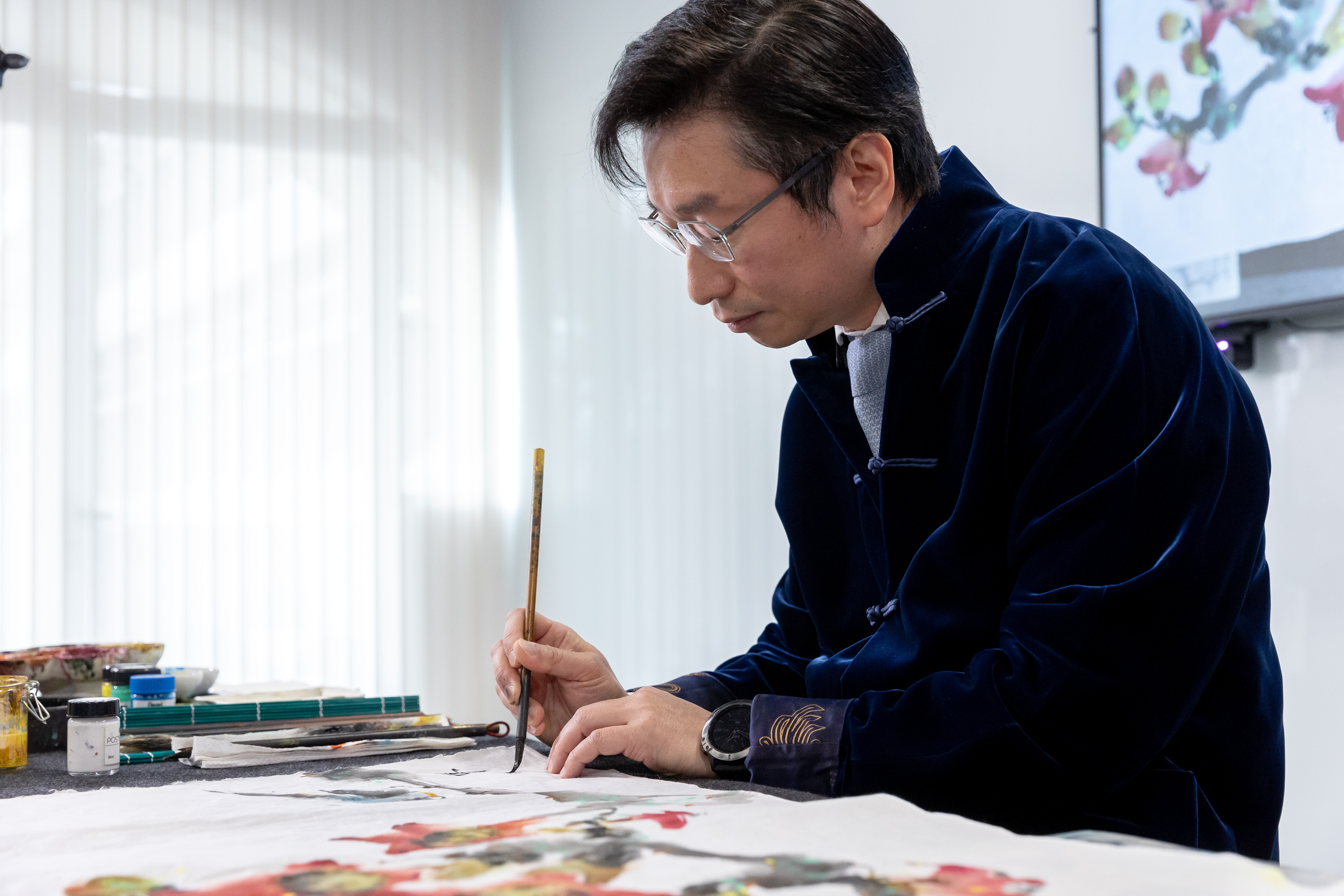
Being a student of Professor Chao Song-an, a master of the Lingnan School of Painting, Philip is particularly fond of drawing the tree cotton.
Q: Who and what are most memorable in the College and the University?
A: I have loved the CUHK campus environment since I was a kid, as my father used to take me here to visit his friend who taught statistics. I opted for Chung Chi College for its rich history, quality of teaching, and well-established support services like the student hostels. Its physical environment is conducive to the studying atmosphere. Most of the dates with my girlfriend (now my wife) involved revision – we used to stay late together as the study room in the library opened after midnight. This collegiate system gave me opportunities to meet with people from other faculties, which is important to help me realize that students from different backgrounds can support one another. This had a profound influence on my academic career to conduct cross-disciplinary research with experts from various faculties.
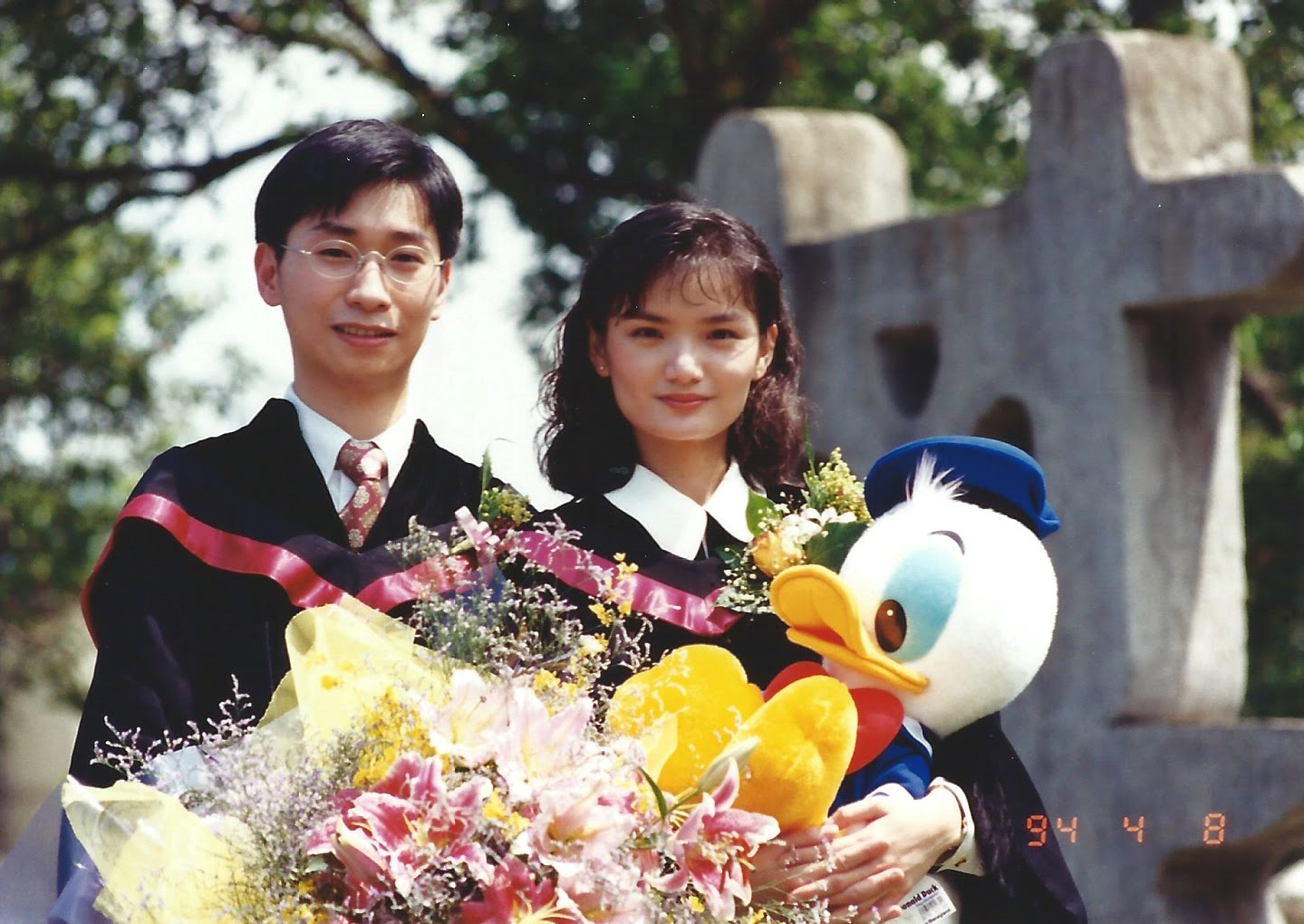
Philip and his wife were classmates at the CUHK Faculty of Medicine.
Q: This is the 43rd year since the establishment of CUHK Faculty of Medicine. How do you think about the future development?
A: I was among the 9th cohort of graduates and now I am the faculty's 9th Dean, bearing witness to the its development. There is an old Chinese saying: "At 40, I had no more doubts. At 50, I understood the will of heaven." In its 43-year history, the Faculty faced different setbacks in its humble beginning, but its grit and hard work have demonstrated our ability to train outstanding doctors and contribute to society through research. Under the leadership of my predecessor, Professor Francis Chan, the Faculty has risen to a prime position to compete and connect with the world. During my deanship, I wish that my exceptional team will achieve more ground-breaking innovations in cross-disciplinary research. More talents are needed to realize this goal. Thankfully, when the new flagship Teaching-Research Complex is completed, it will be primed to provide sufficient resources to train 21st-century doctors. With today's advanced internet technologies, patients and their families can easily access a diverse range of medical information. The roles of a doctor become all the more important, as they must learn how to effectively communicate with the patient and take care of the family's needs.
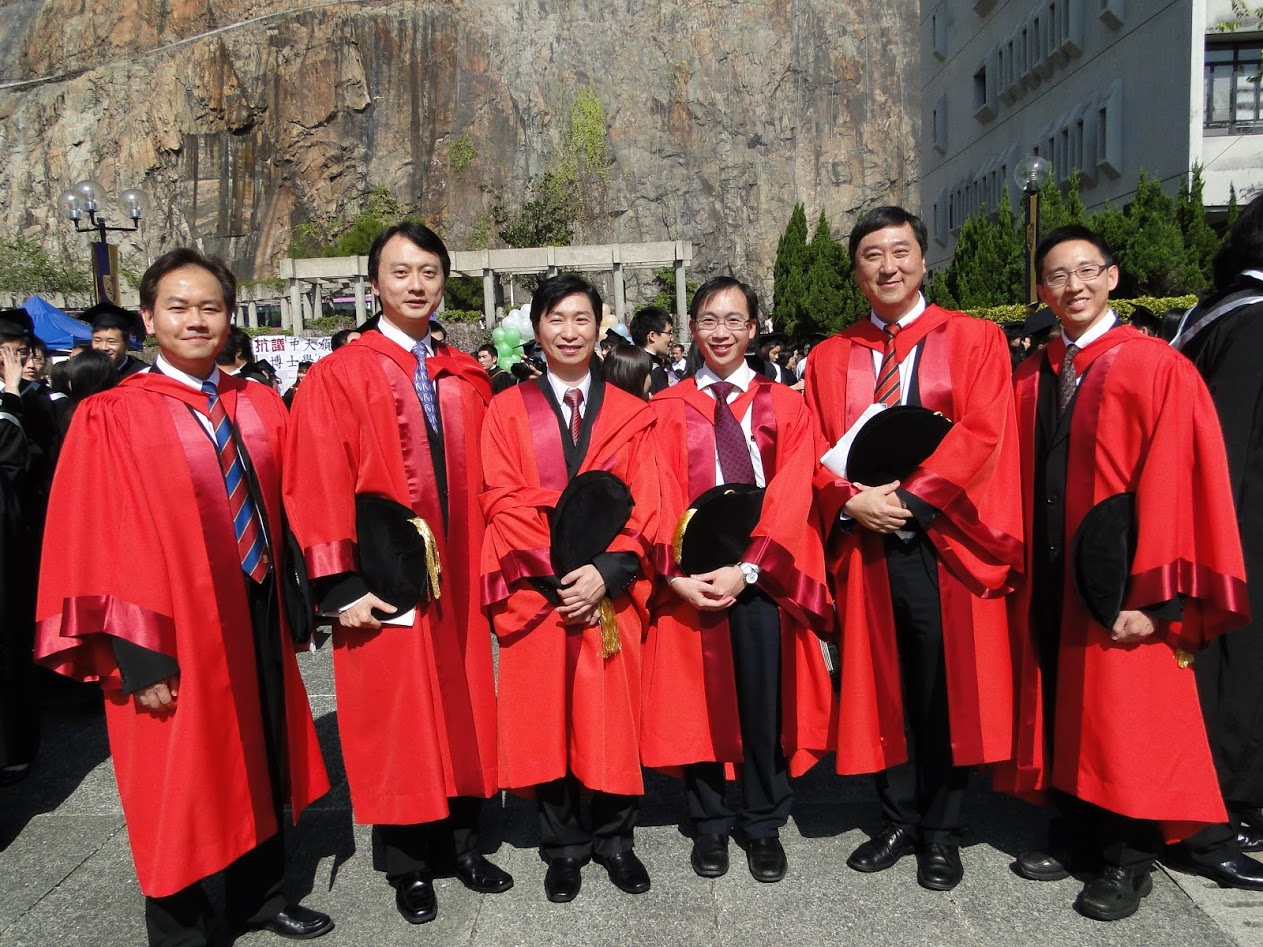
Graduating with his MD, Philip (3rd from left) poses for a photo with former Vice-Chancellor, Professor Joseph Sung (2nd from right), and former Dean of Faculty of Medicine, Professor Francis Chan (2nd from left).
Q: With the rapid development of artificial intelligence (AI) in recent years, do you think it can replace the experience of a doctor?
A: Over the next 10 or so years, the chance of AI replacing doctors is slim. Ask yourself this question: when you go to a clinic, do you prefer a "cold" doctor who churns out texts like ChatGPT or a human doctor who lives and breathes? I believe most people would favor the latter. AI is playing an assistive role now, as patients and families still require real people to communicate with and for treatment. Therefore, the Faculty must enhance the ethics, compassion, and communication education for our students. Being a sci-fi movies fan, this genre has brought creative thinking to inspire future scientific development. Taking "Star Wars" as an example, the Jedi Knight has two robots, namely C-3PO and R2-D2, by his side. While C-3PO is responsible for abstract thinking and R2-D2 is involved in logical thinking, they can never replace the Jedi Knight. Similarly, Jarvis in the "Iron Man" is capable of completing many tasks with simple commands from the protagonist, yet it cannot replace Tony Stark. These are perfect examples of the future of AI. I often tell people that if they are not yet ready to embrace AI-powered automated cars, the days of allowing AI-automated robotic arms to perform operations are further away. After all, it involves human lives.
Q: What are the recent developments for the MRC?
A: Running for four years already, the MRC has always been exploring cutting-edge robotics technology, including the deployment of nano-robots in thrombolytic technology. Although it was considered nearly impossible in the past, the establishment of the MRC has enabled us to experiment on animals or cadaver models and prove that the speed of thrombolysis by nano-robots is faster than conventional methods. This finding helps to promote its application on humans. Furthermore, the MRC is equipped with X-Ray and Magnetic Resonance Imaging (MRI) facilities like the ones in hospitals. Going beyond the verification of the results of scientific research, the MRC also collaborates with start-ups by providing facilities for clinical research, speeding up the process to turn conceptual products into clinical trials. Only with the provision of this platform can the independent research and development of local medical technology be catalyzed further.
Q: What are your aspirations and expectations for the new generation of medical students?
A: A doctor's fundamental responsibility is to treat patients. When you help others, sacrifices have to be made – and you probably find yourself losing more than the average person. The sacrifices are invaluable because human lives are priceless, and so is the sense of accomplishment that comes with your ability to save patients and improve their lives. At the same time, medical developments are progressing rapidly. I graduated 30 years ago in the era of open-chest surgery. With the subsequent minimally-invasive surgery and the endoscopic non-invasive surgery nowadays, the changes have been drastic within a short 30-year timeframe. As a lifelong occupation and commitment, doctors must always stay abreast of new technologies. Hence we must instil an inquisitive mindset. In my opinion, IQ may not be the most important aspect of being a doctor – a considerable level of comprehension and general knowledge would suffice. Emotional quotient (EQ), however, is instrumental in communication with patients and families. Resilience will also help to tackle future challenges.
"CU Alumni Magazine" Video Interview: https://youtu.be/xF8Vx9WTtVg (Chinese only)
Published in "CU Alumni Magazine" Issue 118 by Alumni Affairs Office 2024
Read online: CU Alumni Magazine Issue 118 (Chinese Version Only)
pdf: https://alumni.cuhk.edu.hk/en/magazine/categories/pdfversion/202406
ISSUU: http://www.alumni.cuhk.edu.hk/magazine/issuu/




